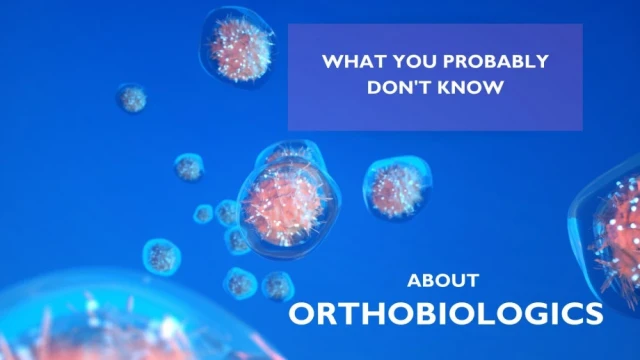
With Bryan M. Saltzman, MD
Orthobiologics -- which you may hear referred to as biologics, cell-based therapy, regenerative medicine or stem cell therapy -- are derived from substances that naturally exist in the body. They may include cells, tissues, growth factors or components of the blood.
Physicians who specialize in orthobiologics are trained to access these naturally-occurring substances in the human body and use them to treat a variety of orthopedic conditions in order to reduce pain and inflammation, stimulate healing or tissue regeneration, and ultimately improve musculoskeletal function.
Helping the Body Heal Faster
Cell-based therapies are composed of a variety of natural growth factors and cytokines which facilitate cell growth/differentiation and recruitment, modulate pain receptors and inflammatory mediators, and stimulate blood vessel growth, matrix synthesis, and tissue maturation/collagen synthesis. Basically, this means that when we talk about orthobiologics or cell therapy we are referring to transplantation of certain kinds of human cells to repair or heal damaged or inflamed tissue and/or cells.
Depending on the type of orthobiologic treatment, there may be higher amounts of pro-inflammatory mediators or potent anti-inflammatory mediators. It’s important to understand that orthobiologic treatments don’t reverse arthritis or re-grow cartilage, but rather control symptoms and help naturally inhibit pain receptors.
The Incredible Human Body
There are several different kinds of cell therapies that can be used to promote healing and reduce inflammation, including:
Platelet-rich plasma (PRP): PRP is obtained by drawing a patient’s blood and spinning it in a centrifuge in order to concentrate the clot-forming platelets from the blood with or without white blood cells. The platelets are then injected directly into the affected area to speed up healing.
Bone marrow aspirate concentrate (BMAC): BMAC is the aspiration of a patient’s bone marrow, typically from the side of the pelvic bone. It is processed to extract a liquid rich in cells, growth factors, and a small percentage of stem cells. This liquid is injected directly into the affected area to speed up healing.
Adipose tissue: Adipose (fat) tissue can be suctioned from the abdomen and processed to remove fat cells. This leaves behind valuable anti-inflammatory mediators and growth factors along with a small percentage of the body’s stem cells, which is injected into the affected area.
Amniotic products: This biologic therapy comes from a healthy donor source after C-section delivery. The amniotic fluid and membrane have hyaluronic acid and unique cells known to reduce inflammation and promote healing. These donor substances are injected into the affected area and are also a type of membrane used during surgeries.
Cartilage transplant: This type of orthobiologic treatment is the surgical transplantation of cartilage to a joint from another part of a joint, or from a donor source. The goal of this type of treatment is to replace an area of bad cartilage and underlying bone in an otherwise healthy joint in order to restore the natural smooth, healthy joint surface.
Be Wary: Avoiding Sub-par Cell Therapy Treatments
I often am asked by patients how orthobiologics at OrthoCarolina differ from highly-advertised treatments that claim to ‘regenerate’ or ‘heal quickly’ without surgery. These companies often market their treatments as cutting-edge stem cell therapy.
The cell-based therapy of orthobiologics that we do at OrthoCarolina are the same products available at what are often referred to as stem cell clinics that are frequently advertised. However, orthobiologics through OrthoCarolina are regulated and backed by extensive orthopedic research. I am working along with other colleagues and research staff to remain at the forefront of basic science and ongoing clinical trial efforts to be leaders in the fields and optimize their use in our clinics.
OrthoCarolina’s Regenerative Medicine Committee oversees and regulates all of our locations and clinics to make sure that orthobiologic practices are responsible and regulated. We also ensure that patients are accurately informed about the therapies including when it comes to standardized cost, which isn’t guaranteed with other clinics. Our physicians are committed to providing patients extensively-researched and fairly price biological treatment options.
Dr. Bryan Saltzman is a fellowship-trained sports medicine and shoulder and elbow surgeon with the OrthoCarolina Sports Medicine Center. He specializes in complex knee reconstruction, cartilage restoration surgery, and augmentation with orthobiologics/cell therapy.
Comments
February 19, 2022
November 07, 2019
November 07, 2019
Back




March 28, 2022
April 01, 2022